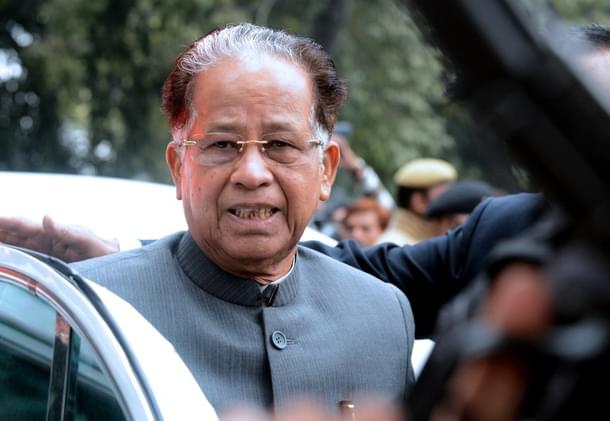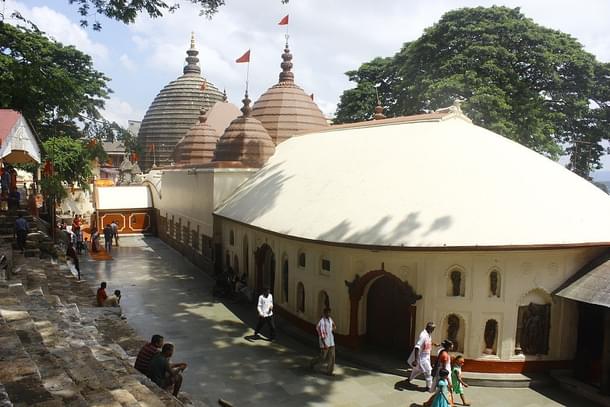Politics
The Nefarious Attempts Of Congress To Takeover Kamakhya Temple
Jayant Chowdhury
Feb 04, 2016, 06:41 PM | Updated Feb 10, 2016, 05:51 PM IST
Save & read from anywhere!
Bookmark stories for easy access on any device or the Swarajya app.


An attempt by the Tarun Gogoi-led Congress government in Assam to take over the management of the ancient Kamakhya templehas been nixed, albeit temporarily.
The state government had introduced a bill (the Assam Sri Sri Maa Kamakhya Devalaya Management Bill, 2015) in the state assembly on Monday that would have led to the creation of a board, headed by a serving or retired IAS officer and comprising members nominated by the government, representatives from the temple management, and the district administration as well as the state revenue and finance departments, to look after the management and development of the temple.
After Bharatiya Janata Party (BJP) and Asom Gana Parishad (AGP) members objected to the bill, the government withdrew it temporarily.

But to fully understand the sinister motive behind the Congress government’s attempt to take over the Kamakhya temple, it is important to delve a bit into its history. The management and administration of the Kamakhya temple, one of the most powerful Shakti peeths and an important religious site for Hindus, has been under two ‘Dolois’ who are elected by the ‘Bardeuris’ or priests of the principal Kamakhya temple, since the time of the Ahom kings.
These Bardeuris are descendants of the famous Kanyakubja Brahmins of Kannauj and were brought over to run the Kamakhya temple by Maharaja Dharmapala of the Pal dynastyin mid-11th century. There are four clans of Bardeuris and each adult male of the four clans (there are around 450 of them) can stand for election to the post of the two Dolois .
The person getting the highest number of votes becomes the ‘Dangor Doloi’ and the one getting the second-highest votes become the ‘Xoru Doloi’ (‘Dangor’ means ‘elder’ in Assamese, and ‘Xoru’ is ‘younger’). The two Dolois have five-year tenures.
In 1992, Jnananda Prasad Sarma and Paran Chandra Sarma were elected as the ‘Dangor’ and ‘Xoru’ Dolois respectively. But when their terms were about to end in 1997, they constituted the Kamakhya Debutter Board to run the temple. Over time, this Board came to be packed with priests and pandas loyal to the Congress, which has been in power for most of the time in Assam since Independence.
The Kamakhya Bardeuri Samaj filed a case against the Debutter Board at the Gauhati High Court in 1998 and the High Court, in November 2011, ruled that the Board had no locus standi and the affairs of the temple should be handed over to the Bardeuris. But the Board challenged this verdict in the Supreme Court which, on July 7, 2015 upheld the High Court verdict. This was a big blow to the Congress government in Assam, which could no longer remote-control the affairs of the temple through the Debutter Board that was packed with its loyalists and lackeys.
But the state government did not honour a vital part of the SC order. “The Supreme Court had asked the district authorities to seize the premises, accounts and properties of the Kamakhya Devalaya from the Debutter Board and hand them over to the Bardeuri Samaj. But even six months after that order, we haven’t got the accounts of the temple and most of the properties. So we filed a contempt petition in the Supreme Court last month,” said Bhaskar Sarma, the secretary of the Kamakhya Bardeuri Samaj.

The bill brought by the Tarun Gogoi government is, thus, a sinister attempt to subvert the Supreme Court order and take over the management of the temple. On getting to know of the state government’s plans to introduce the bill, members of the Bardeuri Samaj launched an indefinite hunger strike from January 30.
The state’s move attracted criticism and widespread condemnation from intellectuals and cultural personas of the state as well as the powerful All Assam Students’ Union and the opposition BJP and the AGP. When the bill was tabled, Opposition members questioned the motive behind the bill, especially since the Kamahya temple was being run perfectly well by the two Dolois and the Bardeuri Samaj. They also said the age-old traditions of the historic shrine should not be interfered with, and pointed out that the Bardeuri Samaj had not been consulted. Facing flak within and outside the Assembly, the government kept the bill in abeyance. However, it has not dropped the bill and chances are that it would try again to introduce and pass the bill.
The Opposition, while questioning the Congress government’s motives, has also pointed out that governments have no business managing the affairs of religious places. “This is a shameless attempt by the Tarun Gogoi government to run the temple through its chosen agents. The government has no business to run a temple or any place of worship, be it a mosque, church, gurdwara or synagogue. The Kamakhya temple is being run perfectly well and the Tarun Gogoi government was trying to subvert last year’s Supreme Court verdict restoring the task of running the temple to the Dolois, as has been the age-old practice. We will strongly oppose any attempt by this government to resuscitate the bill,” said BJP leader Himanta Biswa Sarma.
AGP leaders also spoke in the same vein and wondered why the Tarun Gogoi government is targeting the Kamakhya temple. “In that case, the government should take over the management of all mosques and churches in the state. Can Tarun Gogoi dare do that?” wondered a senior AGP leader.
In Assam, a wide cross-section of the citizenry are dismayed by the Congress government’s attempts to interfere in the management of a Hindu place of worship and are asking if Tarun Gogoi can even think of taking over the management of any mosque or church in the state.
Jayant Chowdhury is an avid observer of and commentator on politics and society in Bengal and eastern, including north-eastern, India.





